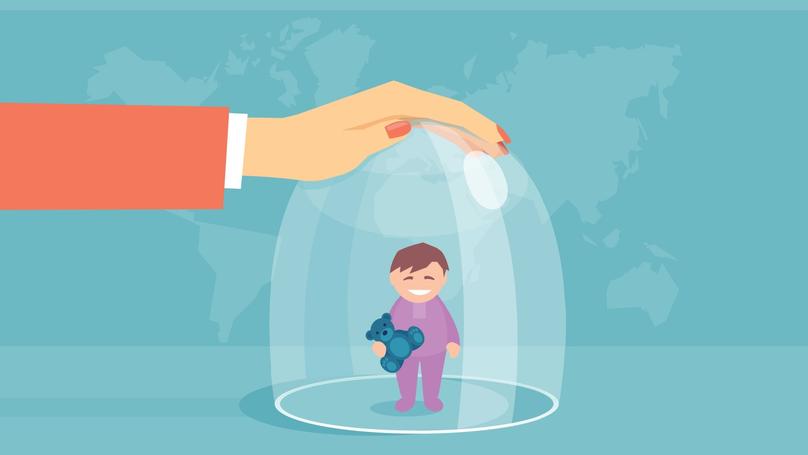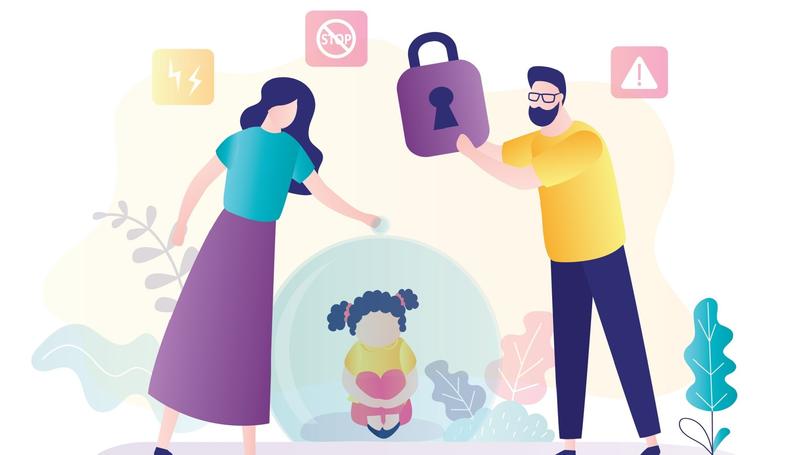Overprotection

What is Overprotectiveness?
Overprotection is a type of child-parent relationship characterized by excessive guardianship and total control over the child. In this interaction style, an authoritative adult (usually a parent, but sometimes a grandparent or another family member) dominates, restricts freedom and choice, and deprives the child of independence.
This phenomenon, also called hyperprotection, describes a parenting style marked by a desire for excessive care and control. Such parents not only pay increased attention to their children and meet all their needs but also shield them from imaginary and false dangers of the outside world. For example, parents might accompany their children to school until age 16, even though the school is only five minutes away.
Overprotection vs. Care: What is the Difference?
At first glance, it may seem that parental interest in a child's life and academic performance, involvement in school affairs, knowledge of their friends, and awareness of what they ate for lunch is positive. However, a fine line separates healthy and necessary care from overprotectiveness, which is not always easy to recognize.
The key difference between hyperprotection and caring guardianship is that in the latter, the parent can take into account the child's actual needs. As the child grows up and begins to understand themselves and their needs better, they should be given opportunities to act independently. This way, they will learn to resolve difficulties and cope with critical situations without relying on the parent's opinion and advice. However, overprotective parents (often mothers) are not ready to accept that their child is growing up and no longer needs constant oversight. They continue to monitor their child's needs and hurry to satisfy or control them as soon as possible.
At the same time, overprotection can also be different. Most often, it takes the following forms:
-
Excessive Control: Parents closely monitor who their child communicates with, what they are doing, where they go, how they study, what clothes they wear, and who their friends are. Overprotective adults believe they know better than the child who they should be friends with,, how they should express themselves, and what they should do. They demand absolute obedience and expect constant reports on everything.
-
Excessive Care: Parents do all the work for the child, such as household duties, school assignments, and errands. They are apprehensive about safety, to the extent of spoon-feeding the child and accompanying them to school, ignoring the child's wishes even when they are adults.
Yes, the external manifestations of total control and care vary. However, the essence of such parental behavior is the same: they fail to recognize that children develop their own needs, desires, and thoughts. They substitute these with their needs, sometimes sincerely believing it is for the best. These parents unconsciously make all the decisions for their children because they are not ready to let them lead independent lives. By doing so, they artificially prolong childhood, but in reality, they prevent the child from growing up and naturally maturing.
Signs of Overprotection
In addition to the already mentioned symptoms, overprotectiveness in the child-parent relationship can manifest as:
-
Ignoring the interests and preferences of the child, making decisions for them.
-
Suppressing the child's initiative and depriving them of independence.
-
Unconscious constant fear for the child's health and safety caused by imaginary threats.
-
Numerous restrictions were imposed, and rules had to be followed without question.
-
Increasing expectations for school performance, sports achievements, and other accomplishments.
In healthy parent-child relationships, parents are typically always ready to offer help, show interest, and care for their child. However, overprotective adults are not accustomed to merely helping; they perform all the child's duties, unreasonably intrude into their personal space, and deprive the child of the opportunity to make decisions or solve problems independently.
Types of Overprotection

Overcontrol and other symptoms of overprotection can manifest differently depending on the family's communication and interaction style. Psychologists identify four main types of overprotective syndrome:
-
Dominant Type: This form of hyperprotection results from an authoritarian upbringing style. In such a family, the child has no voice; their opinions, needs, and desires are ignored. The will of the father and mother is followed without question, and any word from them is considered by the child to be an absolute truth. Additionally, there is a strict system of prohibitions and behavioral rules. Disobedience is severely punished, and the family atmosphere is constant distrust and criticism.
-
Indulgent Type: This type involves the immediate gratification of all the child's whims and desires. The child becomes the idol of the entire family, admired and doted upon. Parents in such a family believe that the child's needs, and sometimes even outright whims, are far more significant than their own. They tend to idealize the child, shielding them from various (even the most harmless) aspects of the outside world, decision-making, and performing daily tasks. Such adults instill in their children a sense of superiority over others and foster hysterical personality traits.
-
Demonstrative Type: In this situation, parents use the child to boost their own self-esteem and status in the eyes of others. Hyperprotection here stems from the adults' insecurity and excessive dependence on the opinions of others. Parents buy their children the most expensive and fashionable clothes, send them to prestigious schools, and enroll them in numerous activities, demanding high achievements. At any opportunity, they showcase the child's medals, certificates, and trophies to others. In other words, the child becomes a means for these parents to satisfy their own ambitions and unmet needs.
-
Inert Type: Adults prone to this kind of hyperprotection cannot accept that their children are growing up, becoming independent, and no longer need them as much as they used to. They continue to care for and control their grown-up child as if they were still young. Women are most often subject to inert hyperprotection. Almost every mother wants to remain the most significant person in her child's life, so she might subconsciously treat them as she did during infancy, when they were completely dependent on her.
Thus, each of the identified types of hyperprotection has both common signs and those that are predominantly found in specific types. For example, total control and suppression of the child's independence are the most striking symptoms of overprotective parents of any type. On the other hand, excessively high expectations for academic performance and achieving various victories are characteristic primarily of the demonstrative type of hyperprotection.
To determine your tendency towards overprotection and identify its dominant type, psychologists have developed and continue to create various tests. These questionnaires help you objectively assess your parenting style and evaluate how appropriate your care for your child is in the given situation. You can find tests for hyperprotection freely available, and they provide results that are close to reality. However, they do not explain the underlying reasons for the unconscious desire for total control.
Reasons for Overprotection
Mothers and grandmothers are most often prone to overprotectiveness. The most common reasons include:
-
Obsessive fears and resulting increased anxiety
-
Lack of love and care in their childhood
-
Attempts to compensate for their parents' mistakes or, conversely, to repeat a family pattern
-
Compensation for their own failures, such as in their career
-
Perfectionism, high self-expectations, the desire to be the perfect parent and raise the "right child"
-
Fear of the child's growing up
Another common reason for overprotection is the absence of other interests and meanings in the parent's life besides the child, especially if the child is the only one. This type of overprotection often arises in fatherless families.
Additionally, mothers who have waited a long time for their firstborn or experienced complications during pregnancy or childbirth are often prone to hyperprotection due to physiological reasons.
Regardless of their motives, overprotective adults' excessive care and total control lead to the most negative consequences, affecting both the parents' and their grown-up children's lives.
Consequences of Overprotection

The main danger of hyperprotection is that it hinders a child's development and prevents the formation of personal boundaries. This leads children to remain infantilized. Furthermore, the excessive worry and anxiety of the parents are transferred to the child, resulting in affective disorders and other issues. One of the most common conditions among children of overprotective parents is neurosis. Many researchers also view overprotection as a cause of mutism in children, where the child loses the ability to speak despite having physiological capability and normal hearing.
Of course, the consequences of overprotection vary depending on the type observed in the family. For instance, most children raised under dominant hyperprotection cannot assert their opinions, think critically, or make decisions. They rely on their parents for everything and act as directed. Indulgent hyperprotection produces individuals with inflated self-esteem and a predominantly hysterical nature, who believe everyone owes them admiration, similar to what they received from their parents. Demonstrative hyperprotection typically intensifies as the child grows, with parents increasingly suppressing their desires and imposing more rules and requirements. Such children, even when adults, become insecure, passive, and dependent on others' opinions. Inert hyperprotection prevents the child from maturing and developing the ability to manage their own life.
More general consequences of overprotection for the child include:
-
Lack of self-confidence
-
Infantilism
-
Learned helplessness syndrome, where the individual believes they cannot control or improve their life
-
Loss of motivation
-
Dependence on others' opinions
-
Inability to make decisions independently
-
Selfishness
-
Asocial behavior and difficulty adapting
-
Avoidance of difficulties and conflicts rather than overcoming them
-
Fear of making mistakes
In extreme cases, children may literally run away from overprotection, leaving home. Parents' "suffocating" care contributes to the development of a histrionic personality type. Moreover, dependencies such as alcoholism, drug addiction, and gambling often result from overprotection, as these children seek independence and the ability to make their own decisions, rejecting adult protection.
The negative effects of overprotection also impact the overprotective parents themselves. In old age, such parents expect the same excessive care and attention they once gave, expressing dissatisfaction and reproach when it is not received. Meanwhile, most adults expect active life participation, self-expression, professional achievement, and independence from their grown-up children. However, having made decisions for their children for many years, parents stifle their children's desire to take any initiative.
For parents, overprotection is characterized by:
-
Irritability
-
Increased anxiety and worry
-
Constant fear
-
Disappointment due to unmet expectations
-
Dependence on others' approval
How to Recognize an Overprotective Parent
Overprotectiveness can often be recognized in a person's speech. Common marker phrases include:
-
"You can't handle this on your own!"
-
"I'll do it myself."
-
"What would you do without me?"
-
"It's too early for you, and you're still too young!"
-
"When you grow up, you'll make your own decisions."
Other warning signs would be when a child, with no obvious delays in their development, cannot perform age-appropriate tasks independently, such as using a spoon, tying shoelaces or doing household chores.
Overprotective parents often believe their child is too fragile, so they shield them from the outside world, select their friends, or straight out prohibit them from talking to friends and going out alone. These adults may also consider their child sickly, inattentive, or careless, thereby justifying their excessive care and demanding obedience, rule-following, and constant reporting.
How a Parent Can Stop Being Overprotective

If you notice symptoms of being an overprotective parent in yourself, it is crucial to first understand the underlying reasons and internal issues that you are trying to address through total control and excessive care, which actually only enable these problems. In such a situation, it is most reasonable to consult a psychologist and discuss your anxiety related to the child, as well as your fears and concerns. While the first steps towards breaking harmful habits-excessive care, perfectionism, and satisfying personal ambitions through your child-can be taken independently, here are a few simple tips:
Tip 1: Allow Yourself to Be an Imperfect Parent
To stop overprotecting means accepting that none of us are perfect, and total control over every step your child takes will not help you avoid parenting mistakes. Overprotection aimed at shielding your child from the world and its challenges to create a "better version" of yourself is a losing strategy. So, take a deep breath, loosen your protective grip, and give yourself and your child the right to have their own interests and desires and, most importantly, make mistakes. The longer you shield your child from the outside world and its difficulties, the harder it will be for them to socialize and interact with reality as an adult.
Engaging in a hobby or a passion can help. Whether it's your own business, joining a book club, knitting, or sports, immersing yourself in something you love makes it easier to give your child more freedom and shift your focus to your interests. This way, you will hardly have time for total control.
Tip 2: Teach Your Child Independence and Initiative
As children grow, they learn more about the world and strive for independence. Minimize your interference in this process. Avoid doing tasks for your child that they can do themselves. Be nearby, support them, and show your readiness to help, but do not take over everything. Otherwise, the child will lose interest in developing new skills, which will be much harder to acquire in adulthood.
Start by refraining from doing homework with your child, especially if they have already finished elementary school. It only helps if the child specifically asks for it. In most cases, this practice is harmful. However, checking the homework of younger students is worthwhile, gradually explaining to them that they will soon need to evaluate their work independently.
Tip 3: Give Your Child the Right to Choose
Children need the freedom to make choices, even if the boundaries of these choices are set by parents. Decision-making is a crucial skill that is primarily learned in parent-child relationships. Therefore, you should allow your child to make choices in various aspects of their life. For example, ask them which shirt they want to wear today or which ice cream they want to buy. It is also important to provide them the freedom to make mistakes, of course, within safe limits. Do not scold them for failures and mistakes; discuss what could have been done better. Remember, no one gets it "perfect" the first time. Learning to calmly and consciously accept and deal with this fact is essential.
Additionally, any decision you make that affects your child's interests should be explained to them, along with the reasoning behind it. This helps the child develop cause-and-effect thinking and learn to make well-considered, rational decisions.
Tip 4: Delegate Responsibilities
Create a list of household chores for your child. Include everything you currently do for them or help them with regularly. Start by assigning simple tasks, such as taking out the trash, washing dishes, or putting away their toys. As they manage these tasks, they gradually expand the list. Remember, even if your child doesn't do something perfectly, it's not a reason to scold them or redo their work. Be patient, and don't expect perfect results.
It is especially important to discuss new rules within the family, talk about upcoming changes, and give your child the opportunity to choose which household chores they would like to do (see Tip 3). If you are dealing with a teenager, don't expect immediate acceptance. Try to explain your position and reach a compromise.
Tip 5: Don't Overestimate Yourself, and Remember That Your Child Is an Individual
Your child is not an extension of their parents. They are a separate person who needs to be listened to, understood, and shown interest and respect for their interests, thoughts, and decisions.
It's also important to understand that parents are not the child's entire world. They have friends and other relatives, and they are also influenced by caregivers in daycare and school. Therefore, no matter how much you want to be, you are not the only significant adult in your child's life. This is another reason to take your child off the pedestal. Of course, their needs are important but not more important than your own. It's time to embrace healthy self-interest.
How to Deal with the Consequences of Overprotection

To break free from parental overprotection, there are a few simple yet seemingly straightforward steps:
-
Move Out
The process of separating from parents and gaining independence and autonomy is called separation. This allows you to take control of your life into your own hands.
Interestingly, separation begins in early childhood, but in the case of overprotective family relationships, it might start much later. For example, when a child makes their first independent decision to move out. However, the goal of separation should not just be moving out but transitioning from a subordinate role to a relationship of equals, that is, "adult to adult."
-
Start Earning
Moving out from your parents should be accompanied by natural consequences: getting your own job, earning a salary, and managing a personal budget. This will help you complete the separation process. You'll learn to handle money independently and spend it as you see fit. Even if you spend your first paycheck on something frivolous, it will be your first mistake, and you'll know better next time.
-
Make Your Own Decisions
Of course, you can seek your parents' opinions and ask for their advice or recommendations. It is important that their words help you form your own opinion rather than automatically replacing it. Consciously make decisions that seem right to you, even if your parents disagree. Remember that the consequences of these decisions will fall solely on you. If you continue to rely on the opinions of others, authoritative adults, or parents, overprotection will persist. Even in personal relationships, you may be inclined to choose an overprotective partner who replaces the figure of a significant adult.
-
Express Your Feelings and Tell Your Parents How Much You Appreciate Their Care
Many parents are overly protective and surround their children with care because they struggle to verbally express their love. It can be difficult for them to directly say "I love you" or "You are very important to me." As a result, they start to "suffocate" the child, proving their love in other ways available to them. You can counter this by telling your parents that you feel their love and appreciate their care, even though sometimes it can be overwhelming.
-
Share Your Achievements
It's not necessary to share only significant victories; everything starts small. Tell your parents about getting a new job, receiving a promotion, passing exams successfully, planning a vacation abroad, and so on. This will help your parents stay connected with you and know what's happening in your life without interfering and controlling your actions.
-
Consult a Psychologist
Dealing with the consequences of overprotection on your own can be very challenging, especially if your parents are not ready for separation. Don't hesitate to seek help from a specialist. Overprotection is one of the most common issues in modern society, regularly addressed by both overprotective parents and their already adult children suffering from it. Moreover, the effects of overprotection can surface unexpectedly, even when you think you have worked through it. Therefore, regular sessions with a psychologist are the best way to overcome the consequences of overprotection, find motivation, deal with dependence on others' opinions, and learn to make adult decisions. A psychologist can help you understand why your parents behaved the way they did, restore your own psychological space, and build healthy relationships.
Conclusion
Overcoming overprotection is possible. Yes, it is a long and painful process, but it will allow you to break free from your parents' suffocating care. If you are an overprotective adult yourself, you can uncover the reasons behind this communication style with your child and find ways to overcome the harmful habit of control and excessive care. You can take the first steps towards improvement on your own, but completely eliminating the causes and consequences of overprotective behavior is only possible with the help of a psychologist, who will analyze all the factors that influenced your family upbringing together with you.























